Australian Catholics received more than 700 entries across the Junior, Intermediate and Senior sections.
Judges had a big task in going through all the articles, photos, and digital entries. There were many creative and engaging works to choose from, and a range of important issues highlighted. It was evident that a great deal of time and passion went into all of the entries. Students' entries clearly demonstrated they were concerned about the environment, racism, gender equality, abuse of people and animals.
In selecting the winners, the judges went for those works they felt had the strongest impact. They also tried to ensure that recognition was given to entries across all formats – articles, photos and digital. Congratulations to the winning stories, photos and digital media entries for standing out from the crowd with some excellent storytelling and fascinating subject matter.
FULL WINNERS' LIST
Junior Section
Winner
Lucia Minto, St Joseph’s Primary School, The Junction, NSW.
Runner-up
Madison O’Brien, St Anthony’s Catholic College, Deeragun, Qld.
Honourable Mention
Maddie Lusby and Xavier Mulley, St Joseph’s Primary School, The Junction, NSW; and Sophie Nikolarakos, St Joseph Primary School, Brunswick West, Vic.
Highly Commended
Lucy Webber, Bonnie Petersen, Abbie Hartnett, Gizelle Griffiths, Josephine Ryba, Meera Sinha, Patrick Aguado, Aidan Soldado, Abi Taber, Isabelle Emmett, Isaac, Chase Firman, Ella, Lillian Scanlon, Eva Cootes, Eden Buxton, Ivy Jones, Ivy Stevens, St Joseph’s Primary School, The Junction, NSW; Quinn Penhale, Joseph Fischer, Aurelia, Giselle Gentilin, Jada Ferrante and Lilly Montalto, St Joseph’s Primary School, Brunswick West, Vic; Nadia Nupiri, Holy Cross School, Trinity Park, Qld; Emily Buriak and Olivia Massey, Loreto Kirribilli, NSW; Lexi Andrews and Piper Kenealy, St Mary’s PS, Malvern East, Vic; Gabriella Abouzeid and Alexia Plakidis, St Peter Chanel PS, Regents Park, NSW; Grace McGillion, St William’s PS, Keperra, Qld; Molly and Oliver Dempsey, St James’ PS, Kotara South, NSW; Lucy Andrew, Holy Cross PS, Kincumber, NSW; Amelie Francesconi, St Catherine Laboure’ PS, Gymea, NSW; Celeste Dalby, St Francis Xavier PS, Ballina, NSW; Milly Collins and Ava O’Brien, St Thomas More PS; Mount Eliza, Vic; Rosita Arias, Don Bosco Catholic PS, Narre Warren, Vic; Simone Lionetti and Isabel Pender, Genazzano, Kew, Vic; Brock Hamilton, Sacred Heart PS, Corryong, Vic; Sabrina Marigliano, St Joseph’s PS, Como, NSW; Gizelle Girgis and Marcus Yap, St Justin’s PS, Wheelers Hill, Vic; and Lilly Robinson, St Therese’s, New Lambton, NSW.
Intermediate Section
Winner
Molly Himsworth, Cabra Dominican College, Cumberland Park, SA.
Runner-up
Sebastian Higham, Cabra Dominican College Cumberland Park, SA.
Honourable Mention
Maxine Kapel, Monte Sant’ Angelo Mercy College, North Sydney, NSW; Kayllen Bala, Thomas Carr College, Tarneit, Vic; and Maggie Dingwall, Cabra Dominican College, Cumberland Park, SA.
Highly Commended
Tiana Ciavarella, St Columba’s College, Essendon, Vic; Rhys Are, Thalia Smith, Jessica Connor, Mia Whitefield, Aiden D’Souza, Cyrus Morales, Thomas Carr College, Tarneit, Vic; Zoe Purcell, Amelie, Rihana Basheer, Isabelle Nsona Malonga, Cabra Dominican College, Cumberland Park, SA; Grace Kulyk and Lily Frangoulis, Ave Maria College, Aberfeldie, Vic; Oliver Vujnovich, Marian Catholic College, Kenthurst, NSW; Izabela Perkovic, Hennessy Catholic College, Young, NSW; Marielena Hawell, Mary MacKillop Catholic College, Wakeley, NSW;
Senior Section
Winner
Phoebe Sheridan, St Joseph’s Catholic College, East Gosford, NSW.
Runner-up
Zoe McGee, Saint Aloysius College, North Melbourne, Vic.
Highly Commended
William Butler, St Paul’s College, Kempsey, NSW; Gabriel Palacios, Villanova College, Coorparoo, Qld; Jesse Warner, Penola Catholic College, Emu Plains, NSW; Kaitlyn Tomizzi, Domremy College, Five Dock, NSW; Laura King, Mackillop College, Bathurst, NSW.
WINNING ENTRIES
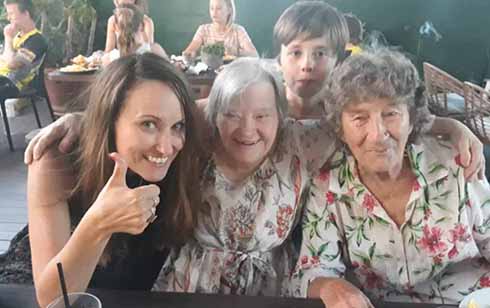 Junior Winner
Junior Winner
Lucia Minto, St Joseph’s Primary School, The Junction, NSW.
The cover is not the book (video entry)
Excerpt from video:
I want us to stop judging people by what is on the cover and take the time to open the book and ask a question: What is your story?
Aunty Mary is my great aunt who has down syndrome. Many people will judge her based on how she looks and how she talks.
But I know her and I know there is so much more to her than what people judge her to be.
Aunty Mary was the youngest of eight children. My Nanna is her big sister.
Her dad died when she was only 18. Then her mum when she was 27. Aunty Mary knows what it feels like to lose people she loves and she still grieves for them.
For the last 4 years she has lived with my Nanna and has become an important part of my life.
When Aunty Mary came to live with my Nanna it changed everything for her and our extended family. She goes everywhere with Nanna, which has included to my school for Book Week, school Masses and open classrooms.
When I was younger, I felt nervous when people stared at her because of how she looked. I was worried that people would make fun of her and me because she looks and sounds different to most people.
Now that I have spent more time with Aunty Mary, I know that there is more to her than the way she looks and sounds. Beneath the cover she’s a really normal person with a quirky personality, feelings, memories, and a deep love for all of us.
Because of Aunty Mary I wonder about people’s stories.
Everyone has a story.
Take the time to see others through different eyes.
Eyes of curiosity, compassion and love.
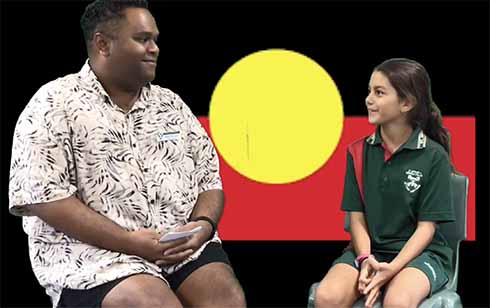 Junior Runner-up
Junior Runner-up
Madison O’Brien, St Anthony’s Catholic College, Deeragun, Qld.
Proud to be Aboriginal
Excerpt from video:
Madison: Have you ever experienced racism?
Elijah Heron-Jia (Indigenous Support Officer): I have, sadly. It probably hasn’t been a big issue, but there are little subtle things that you do take notice of. Like being followed around in shops, or not being greeted at certain places, or not being allowed in to certain places. I do think there has been change, I think there has been progression, and everyone’s being more accepting these days.
Madison: How do you feel about Indigenous people being treated unfairly by the media?
Elijah: It makes me feel sad. It paints a picture that isn’t true. I lot of issues that are happening do involve some Indigenous people, but I feel that we are targeted a lot. I get really upset just because it opens up the public more to feel able to treat us a certain way, when that’s not right.
Madison: What does it mean to you to be Aboriginal?
Elijah: It means culture. It means being proud. It means family. It means community. It means being happy with who you are and being proud to represent your people and your culture.
///////////////////////////
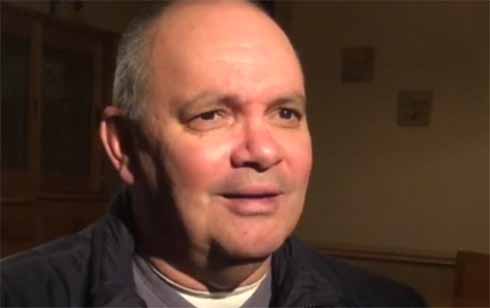 Intermediate Winner
Intermediate Winner
Molly Himsworth, Cabra Dominican College, Cumberland Park, SA.
My culture, my future
Excerpt from video:
Molly: My Uncle, Daryle Rigney is a proud Ngarrindjeri man who is as a professor at the University of Technology in Sydney. He grew up in an era where Aboriginal people were discriminated against and had very little opportunity to succeed in society. He overcame these obstacles and has achieved greatness through education.
Daryle was born to very young parents ( they were 15 at the time of his birth) He grew up in small country towns as his father worked on the railway. When they moved to the city he attended a Western Suburbs school and his father and mother encouraged him to make the most of his education. As a young teenager Daryle was selected to play for the state in AFL. He finished high school and decided to work for a bank. As time went by he realised he wanted more than to work in a bank and play football. He finally made the decision to go to University and study to become a teacher.
Molly: What piece of advice would you give someone to pursue their education?
Daryle: I always say stickability is the thing. Everybody when they go through their studies find times challenging and its a little bit hard and I find its stickability. Hang in there, go and speak to people, seek the help that you need and I always say you really need to think carefully about what your learning. Don’t just accept what people tell you.
I talked earlier about (Kenyan writer and academic) Ngugi wa Thiong’o and this little quote he gave, I love it! He was taking about colonialism and the English coming to Australia and he said, ‘The night of the sword and the bullet was replaced by the morning of the chalk and the blackboard’. What he meant there was that you can’t just control peoples lives in a forceful way for along period of time and that what you try to do is get to their minds to convince them that this is the way things should be done.
Molly: What made you choose the pathway you’ve taken in your career?
Daryle: I got into the career that I’m in as a result of going to university. What that then lead me to do is work in the university supporting Aboriginal students. I got a chance to talk to lots of interesting indigenous people from all over the world. I started to work a lot with my own community trying to see if we could make life better for our people.
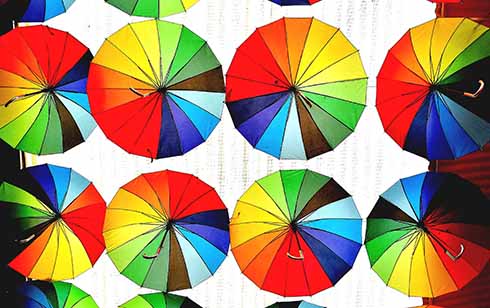 Intermediate Runner-up
Intermediate Runner-up
Sebastian Higham, Cabra Dominican College, Cumberland Park, SA.
The spectrum isn’t what you think it is: My life as an autistic teen
Did you know that 1 in 70 Australians is autistic? Or that Albert Einstein, Greta Thunberg, and many other famous people are autistic? This means that in an average high school year level there’s at least one autistic kid. I am one of those kids.
Autistic people are often considered ‘different’ or weird. We’ve fought hard as a society against discrimination based on the colour of someone’s skin, gender, or religion. Jesus told us to love our neighbour, and I believe that in shining a light on how great being different from one another is, we’ll have a better society. There’s room in the world for both pizza and tacos!
The Aspect Centre for Autism defines autism as ‘a condition that affects how a person thinks, feels and interacts with others and experiences their environment’. To me, autism is a different way of looking at the world. If you think of brains as computers, an autistic brain is just programmed a little bit differently.
Contrary to popular lexicon, not everyone is on the autism spectrum, and saying we are all on the spectrum is dismissive even if the person means well. I have often been told, ‘You don’t look autistic.’ How can someone ‘look’ autistic?
The autism spectrum isn’t a linear path that goes from being not very autistic to extremely autistic. Instead, it’s better represented as a colour wheel.
Autistic people all fit on the wheel in a different way. For instance, I can find things like eye contact hard, but I also have determined focus on things I am interested in - these are called SPINS which is short for special interests. Ask me anything about LEGO!
It’s a myth that autistic people don’t have empathy. In fact, there’s an understanding that autistic people have ‘the double empathy’ problem. That is, that autistic people are expected to have empathy for neurotypical people, but not vice versa. There’s not enough understanding and acceptance of autistic perspectives.
When I was diagnosed with autism many people focused on things I find difficult. Since then, with the help of my family and trusted adults I’ve learned to tackle life based on the strengths I have. I’m proud of being an autistic youth.
I asked autistic specialist Karen, from Autism Outreach Services how she thinks autistic people are treated. Karen said, ‘I feel like there’s a shifting tide with how people with autism are treated. In the past they weren’t treated very well, but now there is much more awareness and acceptance, and society has started to value neurodiversity.
‘I think that they should be treated with equity over equality. Everyone should get what they need.’
At school, I feel like I’m different. This is hard because of the pressure to fit in. Being an autistic kid in high school can feel like a robot voice saying, ‘Anomaly detected, eliminate anomaly.
My school is a pretty accepting place. The teachers are kind, I have good friends but even then, I still feel like a bit of an outsider, especially in the yard. I think if we better understand our differences and highlight our strengths, we can be an inclusive world. One where everyone is accepted for who they are, and where everyone will feel safe being who they are. This won’t just be great for autistic kids like me, but for everyone.
///////////////////////////
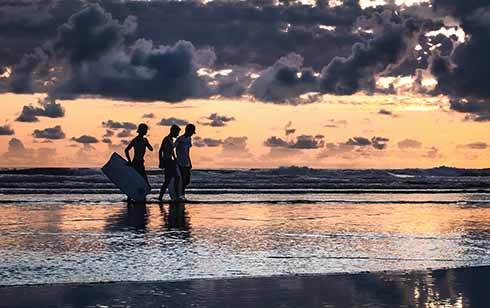 Senior Winner
Senior Winner
Phoebe Sheridan, St Joseph’s Catholic College, East Gosford, NSW.
It will not eVAPEorate
Podcast excerpt:
A vape is an electronic cigarette .. a device that has cartridges filled with a liquid that’s heated into a vapour and usually contains nicotine, flavorings, and chemicals. They can come in all shapes, colours and sizes.
Here’s 14-year-old Charlie from the Central Coast.
Charlie: ‘A lot of people put them in their jumpers and take puffs out of there. They put it in their sleeve and no one can really see it and then they’ll breath it out into their jumper ... They do it in class they do it in toilets and everywhere.’
Vapes have transitioned from a quitting mechanism for smokers to an addictive weapon that has become an attraction to vulnerable and impressionable teenagers…
But while the smell may be mesmerising the effects on your lungs will definitely be unforgettable.
What made a teen suddenly go ooh I’ll try that and spark a chain reaction of 1 in 5 people aged 16 - 17 vaping.
Unfortunately, the chain reaction did not stop with high school students.
Year 7 student, Scarlett: ‘At year 6 camp last year we had a boy bring a vape to camp and it’s infiltrated my high school and the bathrooms have had to be locked because of it.’
Year 8 student, Jack: ‘They see it on Instagram people just doing these tricks with the smoke that comes out the stigma, they think it’s cool.’
I’m 16 and I don’t have the power to adjust the laws or crackdown on regulations surrounding vaping but I do have a voice and I will use it until nothing but a squeak comes out.
So please, I implore you to stop vaping, stop selling stigs and thinking that you are cool. Because unless cool means underground with a tombstone, death by unknown chemicals then put your money, time and health towards something way more important.
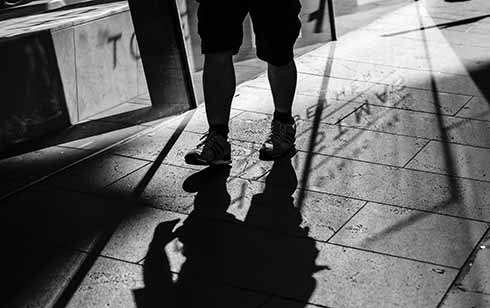 Senior Runner-up
Senior Runner-up
Zoe McGee, Saint Aloysius College, North Melbourne, Vic.
The 116,000
The faint glow of moonlight illuminates the streets, the sidewalks barely distinguishable through the thickness of the night. The intoxicating aroma of witching-hour energy fills my lungs, cold and sharp, it sends a burning chill through my airways.
Clink, clink, clink. The links of my father’s watch band establishes a rhythmic beat to my walking. The old thing died on me a couple weeks ago, time forever stands still at 6.21 pm. Eventide.
I don’t have a particular plan for the night. The weight of my bag grows heavier on my shoulders for every minute that passes. I called him, my brother, last night. I managed to find a payphone, most likely one of the last remaining in Australia. Or the world for that matter. The comforting ‘tik, tik’ of dialing each number was a refreshing moment of composure. The phone call was, needless to say, a lot less comfortable.
The overused monotony of Marie’s thoughts voiced by my brother is enough to drive any man insane; ‘The in-laws are visiting, we’d love to have you over. But I-we think that that house would just be too crowded.’
It’s not like I blame him, it’s not Ray’s fault that I’m in this mess. And it’s not like I want to impose on his marriage, I suppose I just assumed… well never mind.
I thought I’d crash in that decrepit Homyped shoe factory. Most people just used it as a place to squat or shelter themselves from the unforgiving Melbourne winters. To my dismay, and many others’ glee, the factory had been levelled for a new block of copy-paste apartments. Small remnants of graffiti-soaked bricks and drywall were strewn across the fenced-off plot of fragmented grass and cement. The rain that had been plaguing the past few weeks had eroded away the Eureka flag the workers had erected. Now a shredded mess of blue and white, it clung desperately to its last threads, pathetically swaying in the bitter wind.
The rain has started to pick up again, the warmth of my thin undersized pullover is no match for the muscle Melbourne storms employ. Soon enough, the rain had worked up a temper and was now furiously cursing at me from above. Stopping under the brief reprieve of storefront awnings, I survey my surroundings. My vision is now interrupted by the lashings of wind and water, like interference on a TV screen. Through the fog of static, I spy more storefronts across the street. However, to the left of the cafes and bottle shops stands one of those automated public toilets. The neon green glow of the ‘vacant’ light offers me a sigh of melancholic relief.
I feel myself shiver as I press the button to open the door. As it slides open the torrential wind and rain thrash against the metal, begging to come inside with me. Initially, it’s dark. Completely pitch black as the door shuts behind me. The storm has suppressed in noise, an electric buzz consumes the room as the light flickers to life. It is then when I realise how desperate I’ve become. It’s as if a massacre has taken place. The walls and floor are filthy and needles decorate the floor.
In the corner of the room, the least dirty space in the cubicle, I sit down. Huddled into a ball, I pray for sleep to come quickly.
//////////////////////////////////////
Thanks also to our judging panel: Michael McVeigh (Australian Catholics editor), Michele Frankeni (Australian Catholics assistant editor), Fr Andrew Hamilton (Australian Catholics editorial consultant), Neve Mahoney (Eureka Street assistant editor) and Julian Butler SJ (Jesuit Communications staff).